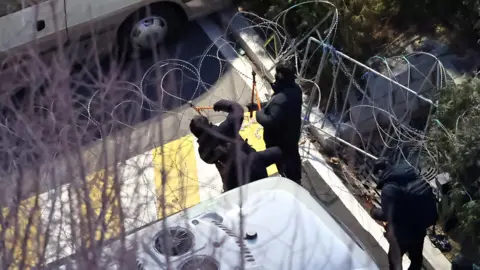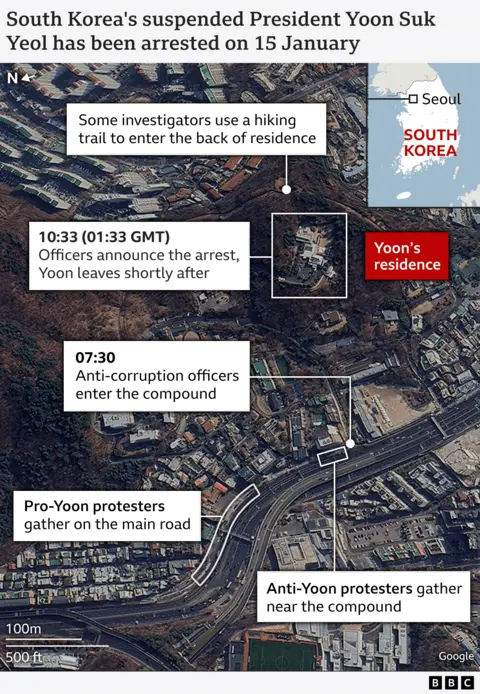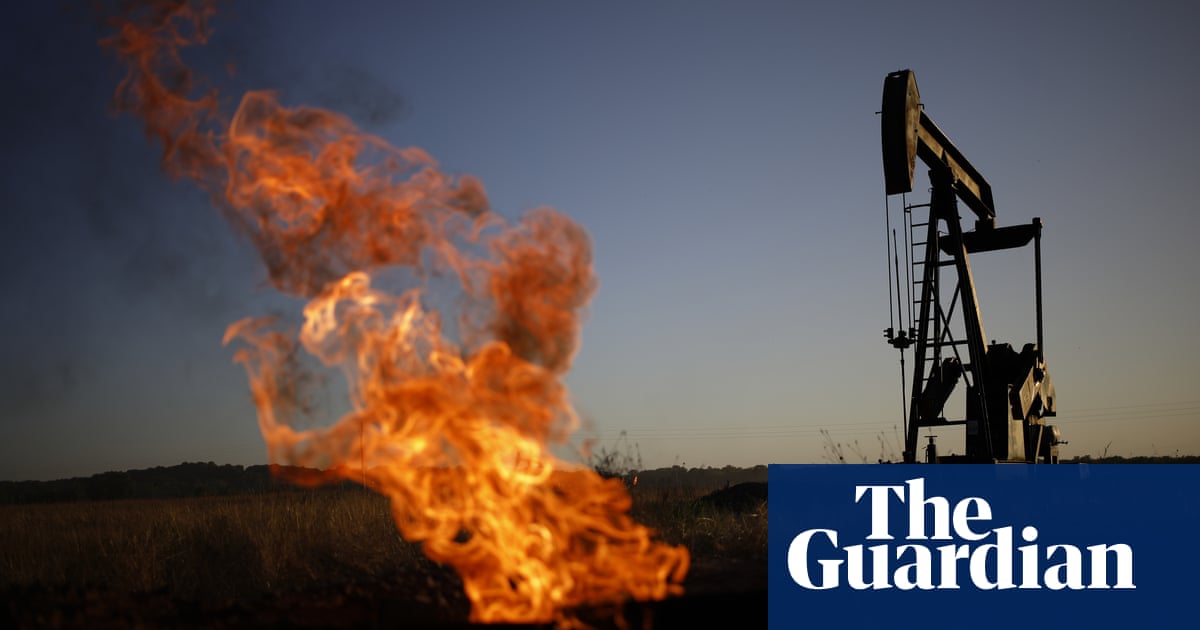
 Reuters
ReutersYoon Suk Yeol has become South Korea’s first sitting president to be arrested after investigators scaled barricades and cut through barbed wire to take him into custody.
Yoon, 64, is being investigated on charges of insurrection for a failed martial law order on 3 December that plunged the country into turmoil.
He has also been impeached by parliament and suspended – but will only be removed from office if the Constitutional Court upholds the impeachment.
However, Yoon’s dramatic arrest on Wednesday brings to an end a weeks-long standoff between investigators and his presidential security team.
Investigators from the Corruption Investigation Office for High-ranking Officials (CIO) failed to arrest him on 3 January after being locked in a six-hour stand-off with his security detail.
But just before dawn on Wednesday, a much larger team of investigators and police arrived at his residence in central Seoul, armed with ladders to climb over buses blocking its entrance and bolt cutters to remove barbed wire.
Other officers in the arrest team, which numbered around 1,000, scaled walls and hiked up nearby trails to reach the presidential residence.
After several hours, authorities announced that Yoon had been arrested.
In a three-minute video released just before his arrest, the 64-year-old leader said he would co-operate with the investigators, while repeating previous claims that the warrant was not legally valid.
“I decided to appear before the CIO, even though it is an illegal investigation, in order to prevent any unsavoury bloodshed,” he said, adding that he witnessed officials “invade” his home’s security perimeter with fire equipment.
On Wednesday afternoon, investigators said Yoon had remained silent throughout questioning.


Yoon’s lawyers have said his arrest was “illegal” because the CIO, as an anti-corruption agency, has no power to investigate the insurrection allegations against Yoon. They also claim the warrant was issued by the wrong jurisdiction.
The same court later dismissed an injunction filed by President Yoon to invalidate the arrest warrant, which the authorities maintain is lawful.
The opposition Democratic Party’s floor leader, Park Chan-dae, said Wednesday’s arrest showed that “justice in South Korea is alive”.
This arrest “is the first step toward restoring constitutional order, democracy and the rule of law”, he said during a party meeting.
The country is currently being led by Finance Minister Choi Sang-mok as acting president. He was thrust into power after the first acting president, Han Duck-soo, was also impeached by parliament, where the opposition has a sizeable majority.
What’s next for Yoon?
The clock has started ticking for investigators.
Under the current warrant, they can hold Yoon for up to 48 hours from the point of arrest, after which they need a new warrant to detain him while he continues to be investigated.
If that warrant is granted, they can detain him for up to 20 days before he is brought to trial. Without a new warrant, Yoon must be released.
Late on Wednesday, local media reported Yoon was questioned in the CIO’s office until 21:40 before being taken to Seoul Detention Centre, approximately 5km (3 miles) away in Uiwang, Gyeonggi Province.
Pro-Yoon supporters continued to protest against the arrest outside the CIO’s office.
They had gathered outside his house since before dawn on Wednesday, along with those opposing him.
The anti-Yoon crowd blasted out a “congratulations and celebrations” song when his arrest was announced, cheering and clapping at what they see as a success for law enforcement.
Yoon’s supporters, however, were dismayed. “We are very upset and angry. The rule of law has broken down,” one of them told the BBC.
Meanwhile, reports emerged that a man set himself on fire near the CIO’s office – although it is not known whether the incident is related to Yoon’s arrest.
The contrasting scenes between these two camps on Wednesday reflect deepening polarisation within the country, which has long been marked by stark divisions between conservatives and progressives.
The political saga has also pit two branches of executive power against each other: law enforcement officers armed with a legal arrest warrant and presidential security staff, who say they are duty bound to protect the suspended president.
As the former president faces questioning over the charges, the nation remains gripped by uncertainty, with no clear resolution to the widening political divide.
How things got to this point
South Korea has been gripped by political turmoil since Yoon’s stunning but short-lived martial law declaration on 3 December, which saw many MPs climb fences and break barricades to enter the National Assembly to vote down the order.
The president said he was protecting the country from “anti-state” forces that sympathised with North Korea, but it soon became clear that he was spurred by his own political troubles.
Yoon has been a lame duck president since the opposition won the general election last April by a landslide – his government has been reduced to vetoing bills proposed by the opposition.
An unprecedented few weeks followed, with parliament voting to impeach Yoon, his subsequent suspension and authorities launching a criminal investigation over the attempt.
Several of the country’s top leaders – including former defence minister Kim Yong-hyun, who reportedly suggested the martial law declaration – and Yoon’s political aides have since also resigned.
Tens of thousands of South Koreans have also braved freezing temperatures and taken to the streets in recent weeks, with some showing their support for Yoon and others calling for him to be removed from office.
All this while Yoon has remained holed up in his residence, refusing to comply with multiple summonses to appear for questioning, a defiant stance that led the authorities to arrest him.
Separately, the Constitutional Court has begun a trial to decide if he should be permanently removed from office, with observers saying it could deliver a ruling as early as February. Its next hearing is due to take place on Thursday.
Additional reporting by Rachel Lee in Seoul
Article by:Source –














Pingback: South Korea impeached president arrested after investigators scale walls - SkyLine News , Your Daily Source